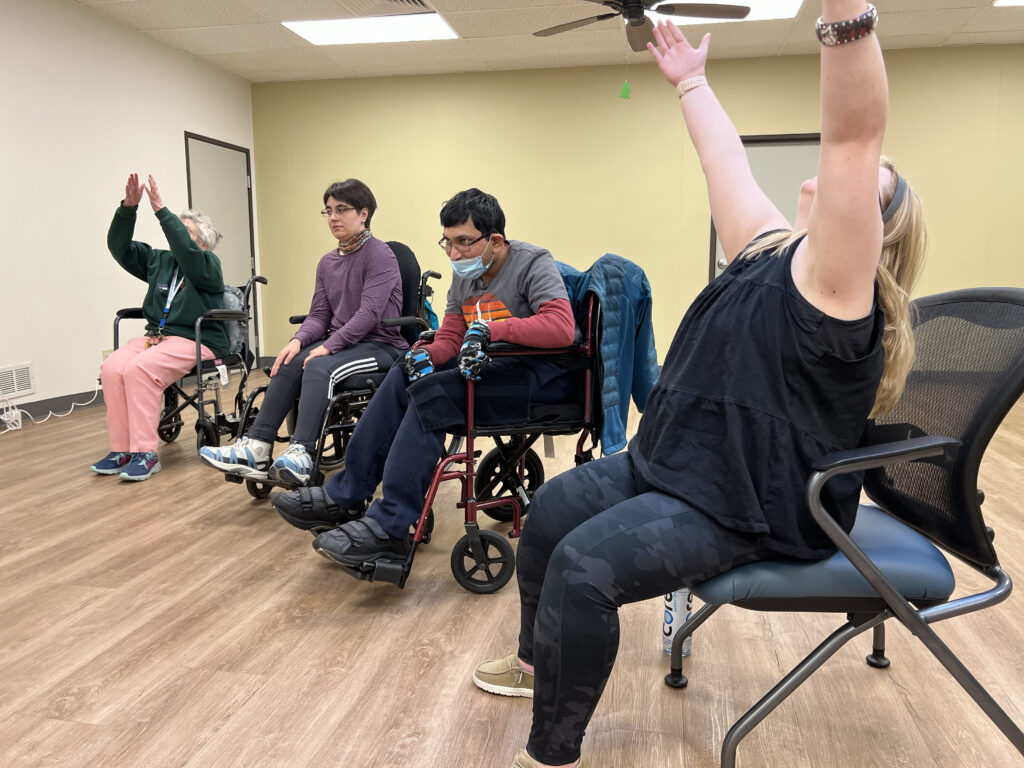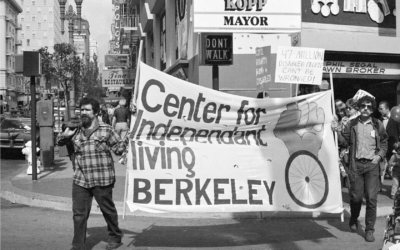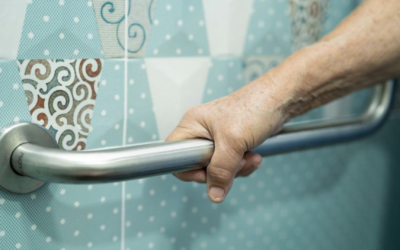(Image: A young man with a prosthetic leg is doing meditation outdoor in a city park.)
May is Mental Health Awareness Month, a time dedicated to raising awareness about mental health issues and promoting the well-being of everyone, especially those in the disability community who may face unique challenges. Managing mental health is a foundational aspect of overall well-being. Professional mental health support can often be challenging to access (read this previous article to learn why). For this reason, it’s important to know what personal resources you can access to be in control of your own mental well being. In this article we will explore personal strategies to regulate and manage mental health.
According to the World Health Organization, approximately 15% of the world’s population lives with some form of disability, and individuals with disabilities are more likely to experience adverse socioeconomic outcomes—such as poorer health, lower education achievements, and lower economic benefit. Mental health conditions are notably more prevalent among people with disabilities; for instance, they are up to five times more likely to report depression and anxiety than those without disabilities. At CPWD we know mental health support can help our community to live to their fullest potential. Learning the skills to manage your own mental health is a foundational aspect of achieving independent living.
Personal Strategies for Managing Mental Health
Seek Professional Support: Accessing mental health professionals who have experience with disabilities can provide tailored support and therapy. This can include psychologists, psychiatrists, or counselors trained in dealing with the specific challenges faced by the disability community. In this article from last week, we included a list of mental health professional resources for people with disabilities.
Establish a Routine: Maintaining a consistent daily routine helps in reducing stress and anxiety levels. This can include regular meal times, regular working in time, and setting aside time for relaxation, friends and family, or hobbies. This leads to a healthier, more balanced life.
Quality sleep in particular is extremely important for good mental health. Sleep is critical because it allows the brain to process emotional experiences and consolidate memories, which is essential for emotional regulation and cognitive function. Quality sleep time helps to lower stress and anxiety, reducing the risk of mood disorders and improving overall mental resilience.

Four individuals are seen participating in CPWD’s Movement and Mindfulness group. Three are wheelchair users.
Physical Activity: Exercise is a powerful tool for managing mental health. For individuals with physical disabilities, adaptive sports, swimming, or exercises tailored to their abilities can help boost mood and reduce anxiety. CPWD has periodic outdoor social adaptive “hikes;” the group is called Walk-Talk-and-Roll. Keep an eye on the services calendar and newsletter for upcoming outings or reach out to us to find out when the next one is happening.
Dale Garr, a member of CPWD’s board of directors and someone who lives with limb loss, recently shared in this video his story of how discovering adaptive skiing soon after losing his leg enhanced his quality of life and recovery significantly.
“That was transformative for me that first year after my accident and really helped with my recovery,” he said. He went on to teach adaptive skiing for several years and find tremendous joy and physical health in the process.
Social Connections: Maintaining relationships and seeking peer support can alleviate feelings of isolation. Support groups can offer a space for sharing experiences and strategies. Here at CPWD, we offer in-person as well as online support groups so people can connect with peers, maintaining healthy connections and resources from others. To join one of our peer support groups, check out our Services Calendar to register and see what groups work for you.
Mindfulness and Relaxation Techniques: Practices such as meditation, deep breathing, and yoga can be adapted to suit different abilities and are excellent for reducing stress and promoting mental well-being. CPWD offers weekly Movement and Mindfulness groups that focus on physical health and relaxation, with practices adapted to each individual’s abilities. You can register here to join these free groups that begin every Wednesday at 2:30 in our Boulder office.
Personal Advocacy: Empowering oneself by learning about one’s rights and available services can reduce feelings of helplessness and improve mental health. This includes understanding disability benefits, healthcare rights, and educational accommodations. To learn more about your rights and ways you can get involved and become an advocate, reach out to CPWD’s community organizer, Craig Towler, at [email protected].
Creative Outlets: Engaging in creative activities like art, music, or writing can provide emotional release and a sense of accomplishment. In our skills training peer groups, we offer activities such as pottery, cooking, gardening and more, where you can learn new skills and make friends. To see the calendar of activities and register, head to our Services Calendar page.
Learning to manage your own mental health is a cornerstone of Mental Health Awareness Month, but its importance extends throughout the entire year. Developing skills to handle stress, recognize early signs of mental health issues, and seek appropriate help encourages personal resilience and well-being. This self-management empowers individuals to lead fuller, more productive lives and contributes to a healthier, more supportive community for everyone. While individuals with disabilities may face additional challenges in managing their mental health, personal strategies tailored to their needs can significantly enhance their quality of life. In the CPWD community, we encourage you to practice these skills and take advantage of our community resources for your personal well being. You can take steps to leading a happier, healthier life.





